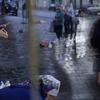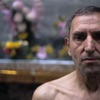New Cabinet Announced
Ukraines president this week unveiled most of his new government of technocrats.
The new cabinet replaces his Orange Revolution team that he dismissed earlier this month in a political crisis marked by allegations of corruption and infighting. Yushchenko announced 16 ministers out of the 23 expected to serve under the new Prime Minister Yuriy Yekhanurov, whom the parliament confirmed last week. Twelve of the appointees had served in the former cabinet. They include Foreign Minister Boris Tarasyuk, Defense Minister Anatoliy Gritsenko, and Interior Minister Yuriy Lutsenko.
However, many expect that the mood of the new cabinet will be dictated by Prime Minister Yekhanurov -- a technocrat with reportedly no political ambition and a history of loyalty to the Ukrainian president.
The new prime minister has said the full cabinet lineup would be announced by the end of the week.
Yurij Yakymenko is the director of Political and Legal Programs at the Oleskandr Razumkov Center for Economic and Political Studies in Kyiv. He says he does not expect the cabinet to pursue any political agenda other than that set by the president and prime minister.
"I think that the main characteristic of this cabinet will be less involvement in politics and there will be absence of any serious conflicts in this field. The change made in this cabinet in comparison with the previous one is that those politicians who participated in public conflicts are not being reappointed," Yakymenko says.
Yakymenko says that not only former Prime Minister Tymoshenko is gone but so are her supporters. They include former Economy Minister Serhiy Teryokhin and former Emergency Situations Minister David Zhvania.
Yakymenko says Yushchenkos move indicates he is aiming for stability, not for radical reforms.
"It isn't a government of grand intentions or a government of some kind of breakthrough. I think it will be a cabinet of stabilization not a cabinet of achieving [some new purposes]," Yakymenko says.
Yakymenko says the president seeks stability and some growth in the economy before the March parliamentary elections.
The analyst also says former Prime Minister Tymoshenko's private visit to Moscow on Saturday -- which saw Russia lift its arrest warrant against her -- is largely explained by the upcoming elections.
He says Tymoshenko is seeking to change her political image and clean herself of corruption allegations coming from her past.
"Primarily, she seeks to clean herself of everything which makes for a negative [influence on her image] both in Ukraine and abroad," Yakymenko says.
Tymoshenko was accused of bribing Russian military officials when she was in charge of Ukraine's main gas distributor in the 1990s, an allegation she denies.
The analyst says Tymoshenko hopes closer relations with Moscow will make her more attractive to Ukrainian pro-Russian voters.
The former prime minister has vowed to stand against Yushchenko's party in the elections and could make a serious challenge with the support of Ukrainians living in the east of the country, which is known for its pro-Russian sympathies.
Oleksiy Kolomiyets, the head of the Kyiv-based Center for European and Trans-Atlantic Studies, says details of the visit are unknown. But he says any reunion of one of Ukraines major Orange Revolution politicians with the Kremlin suggests Moscow may hope to regain influence in Kyiv.
"The visit itself was rather secretive. I think that this trip will not add openness, transparency, and predictability to Ukrainian-Russian relations," Kolomiyets says.
Kolomiyets says the visit -- which took place less than three weeks after Tymoshenko was sacked -- indicates that Moscow is joining the election campaign in Ukraine.
The analyst says many in Ukraine fear that Russian capital might support the princess of the Orange Revolution, who is likely to have good contacts with Russian businessmen.
Aleksey Makarkin from the Political Techniques Center in Moscow says it is in the interests of Moscow to contact as many political players in Ukraine as possible. He told the Russian daily "Gazeta" that the Kremlin "has learned from the 2004 fiasco. No more putting all its eggs in one basket. So the Kremlin will maintain contacts with all major players -- Yushchenko, [Viktor] Yanukovych, [Volodymyr] Lytvyn, and Tymoshenko.





